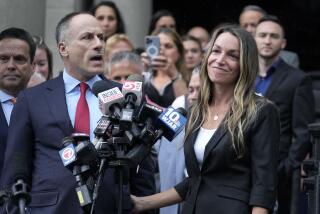Murder Trial Blends Law With Religion
- Share via
A fascinating convergence of religion and the law brought the media in force to a Pomona courtroom Thursday, where a jury must decide if a suspected drunk driver killed Jadine Russell, or her refusal of a blood transfusion did.
As the vehicular murder trial of Keith Cook entered its second day, his attorney tried to show that Cook was not as drunk nor driving as fast as the prosecution suggests; and thus was not murderous when his truck plowed into Russell’s car March 7.
The lawyer plans to mount another, more novel defense claiming that Russell, a 55-year-old Jehovah’s Witness, brought her own death by declining blood at the hospital for religious reasons.
Both the prosecutor and defense attorney in the Pomona Superior Court trial said they know of no similar case.
Deputy Dist. Atty. Larry Larson called a series of police officers Thursday in an attempt to show that Cook, 32, acted with “gross negligence” when he sped along a semi-rural road, drunk, before hitting Russell’s car, which had been disabled in an earlier accident.
Defense attorney Charles Unger, however, through questioning of witnesses, suggested that Cook was not as intoxicated or reckless as alleged.
But the emotional impact of Thursday’s witnesses was clear. Two were police officers still suffering from injuries they received after they came to the scene of Russell’s initial accident, only to be struck themselves.
CHP Officer Craig Stevens told how he arrived on Sierra Madre Avenue to investigate Russell’s collision with a car. Soon, Cook’s skidding pickup was bearing down on him and three others.
The sliding truck hit Russell’s Ford Taurus which, in turn, plowed over Stevens, Russell, her daughter Jennifer and Azusa Police Sgt. Raymond Zamora.
On cross examination, Stevens conceded that he estimated the truck’s speed that night at 50 mph, far less than the 71 to 73 mph suggested by the prosecution. He said he had had too little time to observe the pickup.
Zamora testified that the oncoming truck sounded “like a roller coaster” going 65 mph.
California Highway Patrol Officer Robert Diaz testified that Cook failed four of five field sobriety tests, largely because he did not follow instructions. A portable breath device measured his blood alcohol level at more than twice the legal limit.
Defense attorney Unger got Diaz to acknowledge that Cook’s balance and coordination were not unusually impaired. The defender also said that the choice of sobriety tests was flawed because Cook’s balance was hampered by a head injury.
Unger said he will continue to try to prove that Cook’s speed and level of intoxication, while not defensible, were not grossly negligent.
More to Read
Sign up for Essential California
The most important California stories and recommendations in your inbox every morning.
You may occasionally receive promotional content from the Los Angeles Times.














